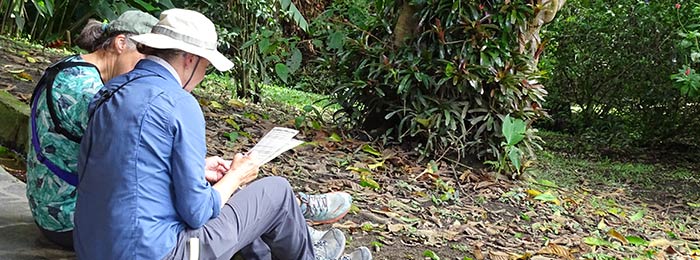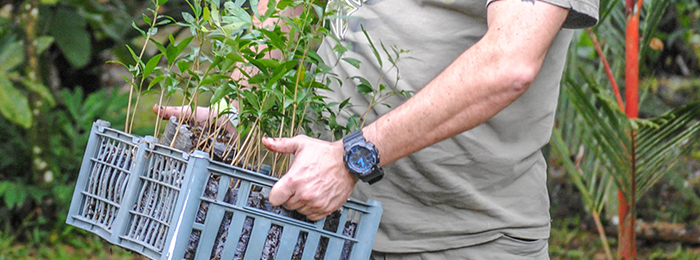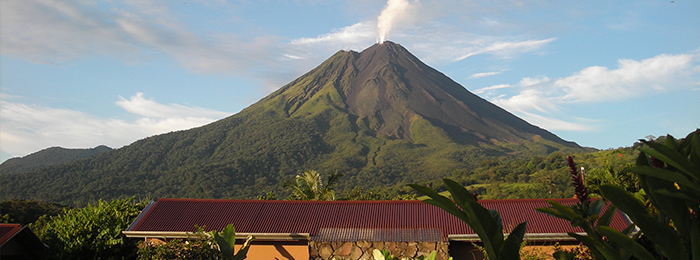Activity Level 2: Easy-Moderate
This program is designed for beginners as well as more advanced birders. It spotlights the Mesoamerican Biological Corridor and Costa Rica Bird Route, featuring both hot and humid rainforests and cold and humid cloud forests. Daily birdwatching excursions with an experienced local birdwatching guide last from 4 to 6 hours. You’ll cover up to three miles at a time, taking your time and pausing to observe birds. Paved and unpaved trails take you up and downhill, occasionally along steps and uneven or slippery surfaces. There is one walk along a canopy walkway suspended 328 feet in the air. Optional activities include a boat ride, whitewater rafting, or horseback riding. Expect high humidity with temperatures between 60˚ and 86˚ F. Elevation changes take you from altitudes of 210 to 10,400 feet. There will be long bus transfers on private, air-conditioned motorcoaches. The longest drive is 5 hours, on curvy mountain roads with birdwatching stops en route.
Entry & Exit Requirements
U.S. citizens must have a valid passport to enter Costa Rica. Passports must be valid for at least the duration of your stay. As this requirement is subject to change at any time without notice, we recommend at least 6 months' validity.
A visa is not required for visits up to 90 days.
If you are not traveling with a U.S. passport, please check with the Costa Rican Embassy for the requirements based on your nationality.
Health Information
IMMUNIZATIONS
The Centers for Disease Control recommends that all travelers be up to date on routine vaccinations such as measles-mumps-rubella (MMR) vaccine, diphtheria-pertussis-tetanus vaccine, varicella (chicken pox) vaccine, and your yearly flu shot before every trip.
There are no vaccinations required for entry into Costa Rica, unless you are traveling from a country where yellow fever transmission is a risk. Though not required for entry, the CDC recommends vaccination against hepatitis A, hepatitis B, and typhoid for most unvaccinated travelers to Costa Rica.
Please consult your physician for additional information and recommendations based on your individual circumstances.
MALARIA
The CDC advises that malaria transmission is present in certain regions of Costa Rica, primarily in the provinces of Alajuela and Limón. Malaria is caused by a parasite found in Anopheles mosquitos, which are active from dusk until dawn. If you are visiting areas where malaria is present and choose to use an anti-malarial drug, as recommended by the CDC, see your doctor for a prescription. To protect against mosquitos, cover exposed skin with lightweight, long-sleeved shirts and pants, consider treating clothes with permethrin, and use an insect repellent containing an active ingredient like DEET or picaridin. Apply sunscreen first, followed by the repellent (preferably 20 minutes later).
OTHER INSECT-BORNE ILLNESSES
Other insect-borne illnesses are known to occur in Costa Rica, including dengue fever, leishmaniasis, Zika virus, and others. Travelers to Costa Rica should protect themselves against insect bites using the measures described above.
After spending time outdoors in grassy or wooded areas, the CDC recommends showering and conducting a full-body check for ticks. If you find a tick attached to your skin, safely remove it as soon as possible.
As a precaution, the CDC advises women who are pregnant to consider postponing travel to any area where Zika virus transmission is ongoing.
OTHER NUISANCE PESTS
In places with rich vegetation and proximity to bodies of water, you may encounter chiggers. These are mites that can superficially attach to skin and leave behind itchy red bumps that appear 3-6 hours after initial contact. Their bites are sometimes mistaken for those of bed bugs or other insects; however, unlike bed bugs, which tend to target exposed skin, chiggers look for skin folds or areas where clothing fits tightly, like the ankles, waist, underarms, elbow creases, and the back of the knees to feed on broken down skin cells. They do not transmit any illnesses in Costa Rica.
We recommend that travelers to Costa Rica protect themselves against chigger bites using the measures noted above. Additionally, if potential exposure occurs, we recommend showering and scrubbing skin with soap and hot water as quickly as possible. If that is not immediately feasible, promptly rub skin with a dry towel or cloth and place any exposed clothing in a zip-top bag until it can be washed. To treat any itchiness, we suggest over-the-counter anti-itch lotion and/or oral antihistamines.
SUN EXPOSURE
The effects of the sun can be damaging to the eyes and skin. Spending time outdoors exposes you to the sun’s harmful ultraviolet (UV) rays, even on cloudy days. To protect yourself from the sun, use a broad spectrum sunscreen of at least SPF 15, protect skin with clothing, wear a wide-brimmed hat and sunglasses, and drink plenty of fluids.
ALTITUDE SICKNESS
If your itinerary includes locations at high elevation (above 5,000 feet), altitude sickness is a possibility. Stay hydrated and well-rested, and avoid heavy, fatty foods and alcohol in the days before arrival. Consult your physician prior to travel for advice specific to your situation.
Respiratory Illness Protocols
Please review our Respiratory Illness Protocols page, which explains our policy and procedures if you or another traveler should develop symptoms of a respiratory illness during your trip. Your participation in a Holbrook Travel program indicates that you are in agreement with these protocols.














